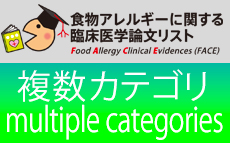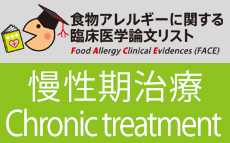アレルギー疾患以外のプロバイオティクスによる免疫調節性効果:最新版/The immunomodulatory effect of probiotics beyond atopy: an update.
更新日:2016年10月21日
| Author: | Vitaliti G, Pavone P, Guglielmo F, Spataro G, Falsaperla R. |
|---|---|
| Title: | The immunomodulatory effect of probiotics beyond atopy: an update. |
| Citation: | Journal of Asthma. 2014 Apr;51(3):320-32. |
| URL: | https://pubmed.ncbi.nlm.nih.gov/24256057/ |
| Abstract: | BACKGROUND: In the past decades, the theory of "allergen avoidance" was considered the standard treatment for preventing the onset of allergic diseases. Recently, the concept of "immune tolerance" has replaced this old theory, and induction of tolerance by exposure is actually considered the appropriate method for preventing atopic diseases and other immunomediated pathologies. On the other hand, it is obvious that for public health reasons, abandoning current medical and hygienic practices is not desirable; therefore, safe alternatives, such as probiotics, have been suggested for providing necessary microbial stimulation. OBJECTIVE: The purpose of our review is to describe the immunomodulatory and anti-inflammatory properties of probiotics, reporting literature data on their effect when used for the treatment of immunomediated diseases. MATERIALS AND METHODS: Articles reporting the evidence on the use of probiotics in immunomediated diseases, such as atopy, cow's milk allergy and rheumatoid arthritis (RA), and in inflammatory diseases, such as inflammatory bowel diseases (IBDs), with or without statistical meta-analysis, were selected in three different search engines: (1) MEDLINE via PubMed interface, (2) Scopus and (3) Google Scholar for all articles published from inception to July 2013. Titles and abstracts of identified papers were screened by two independent reviewers to determine whether they met the eligibility criteria of interest to develop our review. Subsequently, full texts of the remaining articles were independently retrieved for eligibility by the two reviewers. RESULTS AND DISCUSSION: The recent literature is focusing its interest towards the immunologic properties of relatively harmless organisms, including lactobacilli and bifidobacteria, helminths and saprophytic mycobacteria that may skew immune responses towards immunoregulation by inducing Treg cells, rather than eliciting a pro-inflammatory immune response. For this reason, recent researches have been addressed on the use of probiotics to promote immunoregulation in atopic diseases, such as atopic/eczema dermatitis syndrome and food allergy, as well as in inflammatory-based diseases such as IBDs, RA and bronchial asthma. |
| 邦文タイトル: | アレルギー疾患以外のプロバイオティクスによる免疫調節性効果:最新版 |
| 一般向け要約 | 過去には、アレルゲンを除去することがアレルギー性疾患のスタンダードな予防法と考えられていた。しかし最近は免疫寛容の概念が浸透し、アレルゲンを取り入れることにより耐性を誘導することがアレルギーや他の免疫関連疾患の予防に適切な方法と考えられてきている。しかし現行の医療を中止することは望ましくないため、プロバイオティクスのようなもので必要な微生物刺激を加えることが提案されている。そこでプロバイオティクスの効果について調べた。免疫関連疾患(アレルギー、牛乳アレルギー、関節リウマチなど)や炎症性腸疾患に対し、プロバイオティクスを使用して効果に関して報告している2013年7月までに報告された論文をMEDLINE、Scopus、Google Scholarを使って検索した。乳酸菌やビフィズス菌、ぎょう虫などによって、制御性T細胞を誘導して免疫調整をするような論文が多かった。最近の研究は、炎症性腸疾患、リウマチ、気管支喘息と同じように、アレルギー疾患に対する免疫調節を促進するプロバイオティクスの使用注目している。 |
| 専門医コメント | 日本でもプロバイオティクスを含んだ食品が市販されています。最近の研究ではアレルギーに限らずプロバイオティクスによる免疫調節機能に注目が集まっているようですこの論文の筆者は、今後プロバイオティクス単独で治療できるのか、あるいは標準的治療の補助的な役割を果たすようになるのかを研究していく必要があると述べています。 |


